综合英语6课文翻译
全新版大学英语综合教程第二册1~6单元a课文翻译及原文 整理版
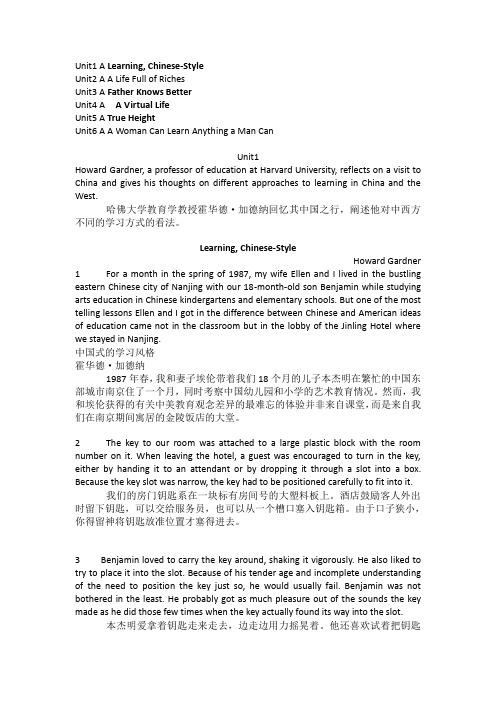
Unit1 A Learning, Chinese-StyleUnit2 A A Life Full of RichesUnit3 A Father Knows BetterUnit4 A A Virtual LifeUnit5 A True HeightUnit6 A A Woman Can Learn Anything a Man CanUnit1Howard Gardner, a professor of education at Harvard University, reflects on a visit to China and gives his thoughts on different approaches to learning in China and the West.哈佛大学教育学教授霍华德·加德纳回忆其中国之行,阐述他对中西方不同的学习方式的看法。
Learning, Chinese-StyleHoward Gardner 1 For a month in the spring of 1987, my wife Ellen and I lived in the bustling eastern Chinese city of Nanjing with our 18-month-old son Benjamin while studying arts education in Chinese kindergartens and elementary schools. But one of the most telling lessons Ellen and I got in the difference between Chinese and American ideas of education came not in the classroom but in the lobby of the Jinling Hotel where we stayed in Nanjing.中国式的学习风格霍华德·加德纳1987年春,我和妻子埃伦带着我们18个月的儿子本杰明在繁忙的中国东部城市南京住了一个月,同时考察中国幼儿园和小学的艺术教育情况。
研究生英语综合教程UNIT6课文及翻译(含汉译英英译汉)
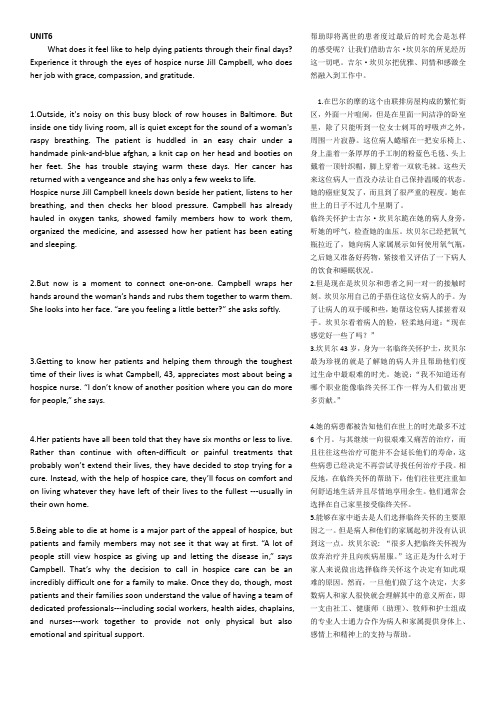
UNIT6What does it feel like to help dying patients through their final days? Experience it through the eyes of hospice nurse Jill Campbell, who does her job with grace, compassion, and gratitude.1.Outside, it's noisy on this busy block of row houses in Baltimore. But inside one tidy living room, all is quiet except for the sound of a woman's raspy breathing. The patient is huddled in an easy chair under a handmade pink-and-blue afghan, a knit cap on her head and booties on her feet. She has trouble staying warm these days. Her cancer has returned with a vengeance and she has only a few weeks to life. Hospice nurse Jill Campbell kneels down beside her patient, listens to her breathing, and then checks her blood pressure. Campbell has already hauled in oxygen tanks, showed family members how to work them, organized the medicine, and assessed how her patient has been eating and sleeping.2.But now is a moment to connect one-on-one. Campbell wraps her hands aro und the woman’s hands and rubs them together to warm them. She looks into her face. “are you feeling a little better?” she asks softly.3.Getting to know her patients and helping them through the toughest time of their lives is what Campbell, 43, appreciates most about being a hospice nurse. “I don’t know of another position where you can do more for people,” she says.4.Her patients have all been told that they have six months or less to live. Rather than continue with often-difficult or painful treatments that probably won’t extend their lives, they have decided to stop trying for a cure. Instead, with the help of hospice care, they’ll focus on comfort and on living whatever they have left of their lives to the fullest ---usually in their own home.5.Being able to die at home is a major part of the appeal of hospice, but patients and family members may not see it that way at first. “A lot of people still view hospice as giving up and letting the disease in,” says Campbell. That’s why the decision to c all in hospice care can be an incredibly difficult one for a family to make. Once they do, though, most patients and their families soon understand the value of having a team of dedicated professionals---including social workers, health aides, chaplains, and nurses---work together to provide not only physical but also emotional and spiritual support. 帮助即将离世的患者度过最后的时光会是怎样的感受呢?让我们借助吉尔·坎贝尔的所见经历这一切吧。
李荫华《全新版大学英语综合教程(6)》(第2版)学习指南【词汇短语+课文精解+全文翻译+练习答案】-
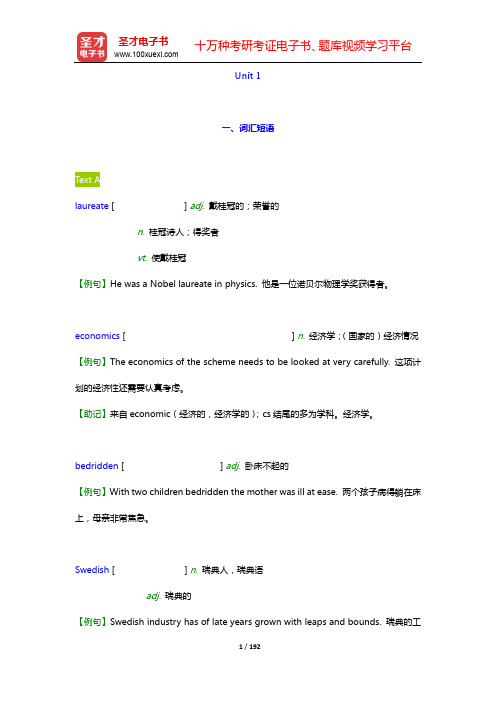
Unit 1一、词汇短语Text Alaureate [] adj. 戴桂冠的;荣誉的n. 桂冠诗人;得奖者vt. 使戴桂冠【例句】He was a Nobel laureate in physics. 他是一位诺贝尔物理学奖获得者。
economics [] n. 经济学;(国家的)经济情况【例句】The economics of the scheme needs to be looked at very carefully. 这项计划的经济性还需要认真考虑。
【助记】来自economic(经济的,经济学的);cs结尾的多为学科。
经济学。
bedridden [] adj. 卧床不起的【例句】With two children bedridden the mother was ill at ease. 两个孩子病得躺在床上,母亲非常焦急。
Swedish [] n. 瑞典人,瑞典语adj. 瑞典的【例句】Swedish industry has of late years grown with leaps and bounds. 瑞典的工业近年来飞跃增长。
revolutionary [] adj. 革命的;革新的n. 革命者;革命党人【例句】Many revolutionaries died for the revolution before the liberation. 在解放前,许多革命者为革命而牺牲了。
postwar [] adj. 战后的【例句】During the postwar years in Germany honors were heaped upon Einstein. 战后,爱因斯坦在德国备受称颂。
recognition [] n. 认出,辨认;承认;赏识【例句】My recognition of him was immediate. 我立刻认出是他。
【词组】in recognition of表彰,报偿beyond recognition 面目全非;识别不出raspy [] adj. (声音)刺耳的;易怒的;粗糙的【例句】My voice is raspy because I have a cold. 我的声音很刺耳,因为我感冒了。
Unit Six 21世纪大学实用英语综合教程第二册课文翻译及课后答案
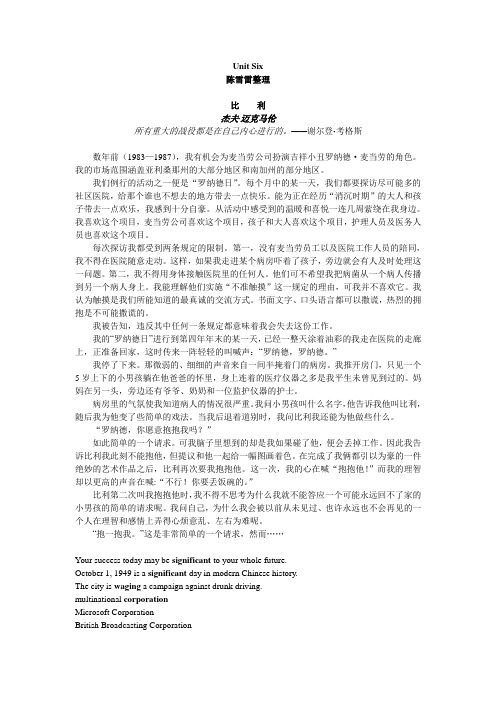
Unit Six陈雪雷整理比利杰夫·迈克马伦所有重大的战役都是在自己内心进行的。
——谢尔登·考格斯数年前(1983—1987),我有机会为麦当劳公司扮演吉祥小丑罗纳德·麦当劳的角色。
我的市场范围涵盖亚利桑那州的大部分地区和南加州的部分地区。
我们例行的活动之一便是“罗纳德日”。
每个月中的某一天,我们都要探访尽可能多的社区医院,给那个谁也不想去的地方带去一点快乐。
能为正在经历“消沉时期”的大人和孩子带去一点欢乐,我感到十分自豪。
从活动中感受到的温暖和喜悦一连几周萦绕在我身边。
我喜欢这个项目,麦当劳公司喜欢这个项目,孩子和大人喜欢这个项目,护理人员及医务人员也喜欢这个项目。
每次探访我都受到两条规定的限制。
第一,没有麦当劳员工以及医院工作人员的陪同,我不得在医院随意走动。
这样,如果我走进某个病房吓着了孩子,旁边就会有人及时处理这一问题。
第二,我不得用身体接触医院里的任何人。
他们可不希望我把病菌从一个病人传播到另一个病人身上。
我能理解他们实施“不准触摸”这一规定的理由,可我并不喜欢它。
我认为触摸是我们所能知道的最真诚的交流方式。
书面文字、口头语言都可以撒谎,热烈的拥抱是不可能撒谎的。
我被告知,违反其中任何一条规定都意味着我会失去这份工作。
我的“罗纳德日”进行到第四年年末的某一天,已经一整天涂着油彩的我走在医院的走廊上,正准备回家,这时传来一阵轻轻的叫喊声:“罗纳德,罗纳德。
”我停了下来。
那微弱的、细细的声音来自一间半掩着门的病房。
我推开房门,只见一个5岁上下的小男孩躺在他爸爸的怀里,身上连着的医疗仪器之多是我平生未曾见到过的。
妈妈在另一头,旁边还有爷爷、奶奶和一位监护仪器的护士。
病房里的气氛使我知道病人的情况很严重。
我问小男孩叫什么名字,他告诉我他叫比利,随后我为他变了些简单的戏法。
当我后退着道别时,我问比利我还能为他做些什么。
“罗纳德,你愿意抱抱我吗?”如此简单的一个请求。
全新版大学英语(第二版)综合教程5-Unit-6课后答案及课文翻译
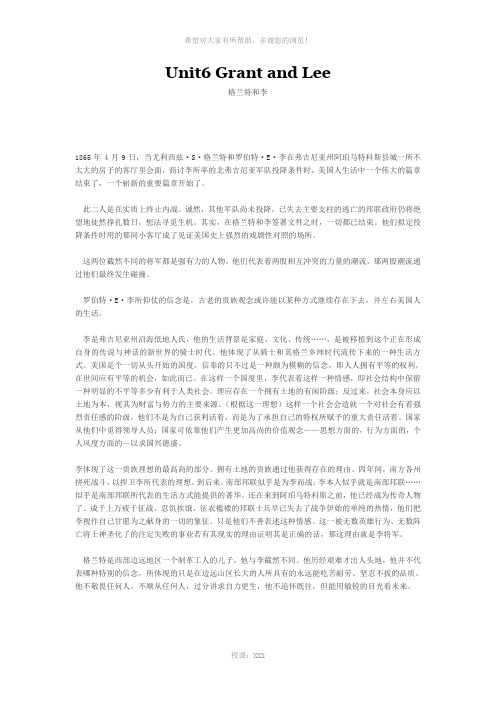
Unit6 Grant and Lee格兰特和李1865年4月9日,当尤利西兹·S·格兰特和罗伯特·E·李在弗吉尼亚州阿珀马特科斯县城一所不太大的房子的客厅里会面,商讨李所率的北弗吉尼亚军队投降条件时,美国人生活中一个伟大的篇章结束了,一个崭新的重要篇章开始了。
此二人是在实质上终止内战。
诚然,其他军队尚未投降,已失去主要支柱的逃亡的邦联政府仍将绝望地徒然挣扎数日,想法寻觅生机。
其实,在格兰特和李签署文件之时,一切都已结束。
他们拟定投降条件时用的那间小客厅成了见证美国史上强烈的戏剧性对照的场所。
这两位截然不同的将军都是强有力的人物,他们代表着两股相互冲突的力量的潮流,那两股潮流通过他们最终发生碰撞。
罗伯特·E·李所仰仗的信念是,古老的贵族观念或许能以某种方式继续存在下去,并左右美国人的生活。
李是弗吉尼亚州沿海低地人氏,他的生活背景是家庭、文化、传统……,是被移植到这个正在形成自身的传说与神话的新世界的骑士时代。
他体现了从骑士和英格兰乡绅时代流传下来的一种生活方式。
美国是个一切从头开始的国度,信奉的只不过是一种颇为模糊的信念,即人人拥有平等的权利,在世间应有平等的机会,如此而已。
在这样一个国度里,李代表着这样一种情感,即社会结构中保留一种明显的不平等多少有利于人类社会。
理应存在一个拥有土地的有闲阶级;反过来,社会本身应以土地为本,视其为财富与势力的主要来源。
(根据这一理想)这样一个社会会造就一个对社会有着强烈责任感的阶级,他们不是为自己获利活着,而是为了承担自己的特权所赋予的重大责任活着。
国家从他们中觅得领导人员;国家可依靠他们产生更加高尚的价值观念——思想方面的,行为方面的,个人风度方面的—以求国兴德盛。
李体现了这一贵族理想的最高尚的部分。
拥有土地的贵族通过他获得存在的理由。
四年间,南方各州拼死战斗,以捍卫李所代表的理想。
到后来,南部邦联似乎是为李而战;李本人似乎就是南部邦联……似乎是南部邦联所代表的生活方式能提供的菁华。
大学跨文化英语 综合教程I Unit 6 Making Sense of China课文翻译
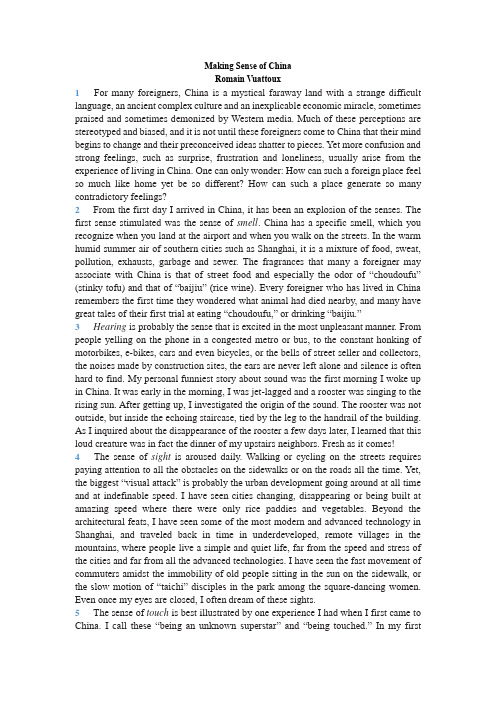
Making Sense of ChinaRomain Vuattoux1 For many foreigners, China is a mystical faraway land with a strange difficult language, an ancient complex culture and an inexplicable economic miracle, sometimes praised and sometimes demonized by Western media.Much of these perceptions are stereotyped and biased, and it is not until these foreigners come to China that their mind begins to change and their preconceived ideas shatter to pieces. Yet more confusion and strong feelings, such as surprise, frustration and loneliness, usually arise from the experience of living in China. One can only wonder: How can such a foreign place feel so much like home yet be so diff erent? How can such a place generate so many contradictory feelings?2 From the first day I arrived in China, it has been an explosion of the senses. The first sense stimulated was the sense of smell. China has a specific smell, which you recognize when you land at the airport and when you walk on the streets. In the warm humid summer air of southern cities such as Shanghai, it is a mixture of food, sweat, pollution, exhausts, garbage and sewer. The fragrances that many a foreigner may associate with China is that of street food and especially the odor of “choudoufu” (stinky tofu)and that of “baijiu” (rice wine). Every foreigner who has lived in China remembers the first time they wondered what animal had died nearby, and many have great tales of their fi rst trial at eating “choudoufu,” or drinking“baijiu.”3 Hearing is probably the sense that is excited in the most unpleasant manner. From people yelling on the phone in a congested metro or bus, to the constant honking of motorbikes, e-bikes, cars and even bicycles, or the bells of street seller and collectors, the noises made by construction sites,the ears are never left alone and silence is often hard to find. My personal funniest story about sound was the first morning I woke up in China. It was early in the morning, I was jet-lagged and a rooster was singing to the rising sun. After getting up, I investigated the origin of the sound. The rooster was not outside, but inside the echoing staircase, tied by the leg to the handrail of the building. As I inquired about the disappearance of the rooster a few days later, I learned that this loud creature was in fact the dinner of my upstairs neighbors. Fresh as it comes!4 The sense of sight is aroused daily. Walking or cycling on the streets requires paying attention to all the obstacles on the sidewalks or on the roads all the time. Yet, the bigge st “visual attack” is probably the urban development going around at all time and at indefinable speed. I have seen cities changing, disappearing or being built at amazing speed where there were only rice paddies and vegetables. Beyond the architectural feats, I have seen some of the most modern and advanced technology in Shanghai, and traveled back in time in underdeveloped, remote villages in the mountains,where people live a simple and quiet life, far from the speed and stress of the cities and far from all the advanced technologies. I have seen the fast movement of commuters amidst the immobility of old people sitting in the sun on the sidewalk, or the slow motion of “taichi” disciples in the park among the square-dancing women. Even once my eyes are closed, I often dream of these sights.5 The sense of touch is best illustrated by one experience I had when I first came to China. I call these “being an unknown superstar” and “being touched.” In my f irsteducational establishment, I sometimes had to teach in another campus on the other side of town. I would ride my bicycle across town to get to class, and it often felt like being in a movie. All the kids and adults stared and pointed to the “laowai” (foreigner) on his bicycle. As I took an excursion in the “deep” countryside, many people would approach me while I was buying some water or some snack and would start touching the hair on my arms.6 For foreigners as for Chinese, the most important sense is the sense of taste. It is also certainly the one that provides the most pleasure and the base of many relationships.I have been invited to many meals and took part in ceremonial drinking. I have seen food displays that are as elaborate as their tastes. Thousand-year-old eggs, snake, turtle, dumplings, bamboo,lotus root, pigs ears, lacquered ducks, duck neck and head, chicken feet,spicy fish head, the hundreds of ways of eating tofu are just some of the dishes that one discovers and appreciates. A lifetime would never suffice to try to taste all the specialties in China.7 Orderly chaos, disorganized order, old and new, beautiful and filthy,clean and dirty, rich and poor, kindness and arrogance ... All are opposed sensations and situations living together, side by side. For me, China is a collision of feelings, a juxtaposition of experiences and perceptions that are usually contradictory. China is all these contradictions and diversity that somehow manage to live together almost harmoniously.参考译文解读中国罗曼·瓦图对于很多外国人而言,中国是一个遥远而神秘的国度,有着奇特难懂的语言,古老深奥的文化,以及难以解释的经济奇迹,时而被西方媒体戴高帽,时而被他们妖魔化。
大学跨文化英语 综合教程I Unit 6 Getting Stared at in China课文翻译

Reading & DigestingGetting Stared at in ChinaAri James1 Have you ever walked into a room and caught everyone’s attention at once? Have you ever been gazed at, from top to bottom, as if you were an ancient, foreign relic on display? Have you ever stared back, challenging,only to have your surveyors continue to watch you, as if nothing has happened?2 These are daily occurrences for foreigners in China. I am stared at every single day as I go about my daily life. Be it on the street, in a store,or on the subway, I am stared at like a walking spectacle. While I cannot speak for all foreigners, I can, however, seek to critique and expand upon my own experiences in a global context.3 Chinese people are curious about the outsider, this I understand.However, staring is the least of it. Bolder strangers have asked to take a picture with me, or even of me. On a class trip, my two close friends and I, all women of color, noticed that people were sneaking pictures of us. Even worse, there was one older gentleman who approached us and asked to take photographs of us. Awkward and stunned into silence, he took our lack of response as an affirmative, and began positioning us the way he wanted us. Standing or kneeling, we did it all. I feel stupid now for having gone along with it, but as our professor stood behind the man and took pictures of us as well, laughing delightedly, it was difficult to see the insidious nature behind the hilarity of the situation.4 On my street in Nanjing, where I lived for four months, my neighbors continued to fall into a hush at the sight of me, their heads turning around quickly to watch as I neared. I have become friendly with some of them,gone so far as to chat with them, but the staring never ends. I continue to be the visiting roadside attraction, promising the audience new and exotic sights. There are hushed whispers in my wake, and every time, I wonder:when will they grow tired of me?5 The stares are not in any way malicious. I am entirely aware of this,but they are still able to catch my attention every time, to correct me whenever I dare to think thatI have grown accustomed to life here.6 As a multi-racial woman, it is difficult not to see the differences in the way varying foreigners are treated. From what I have experienced in the past, most Caucasian men seem to be approached with a sense of awe. These Caucasian men are asked if they are celebrities, perhaps even compared to Brad Pitt, before a request to take a selfe is posed. This could be the typical example of Western idolization in the East and the effect of years of Western media on Chinese culture. But perhaps, this is also tied to the colorism1 that is often rooted in Chinese culture and media.7 From every angle, Chinese people are bombarded with skin whitening products, with advertisements that feature Caucasian rather than Asian models, and whiteness continues to be idealized. The bud of bias in that very notion is that foreigners have come to be equated with whiteness.While the intent is not that of discrimination, the result is shockingly close.Where this notion leaves the rest of us, people of color, I do not know. In a culture obsessed with whiteness, where do the rest of us stand?8 From my experience alone, the lack of representation, and perhaps the lack ofunderstanding about other cultures, fuel the curiosity that many people I come across tend to possess. Curiosity is welcomed, and even encouraged. Curiosity will even ultimately be the key to fixing this problem. With education and exposure to different peoples and cultures,China can and will continue to flourish as a global hub. However, when curiosity begins to breed a lack of respect and consideration for others,that is where it has the ability to change into racism and even xenophobia.9 As China continues to globalize in an effort to make its mark on the economic marketplace and the cultural zeitgeist, I fear that it will be the lack of empathy and insensitivity that will stand in its way. Beijing is already a global center, with foreigners on almost every street, and yet this type of insensitivity continues to occur. Foreigners are here to enrich their lives, to learn more about China’s long history, and hopefully to make a positive impact on it as well. They deserve more appreciation and respect rather than mere staring eyes.参考译文在中国接受注目礼阿丽·詹姆斯你是否曾经走进一个房间,一下子就吸引了所有人的目光?你是否曾被人从头到脚审视,仿佛你是一件被展出的外国文物?你是否曾挑战性地回瞪对方,结果对方却好像什么事都没发生一样继续看着你?对生活在中国的外国人来说,这如同家常便饭。
邱东林_基础综合英语(研究生)_1至7单元完整版-课文翻译
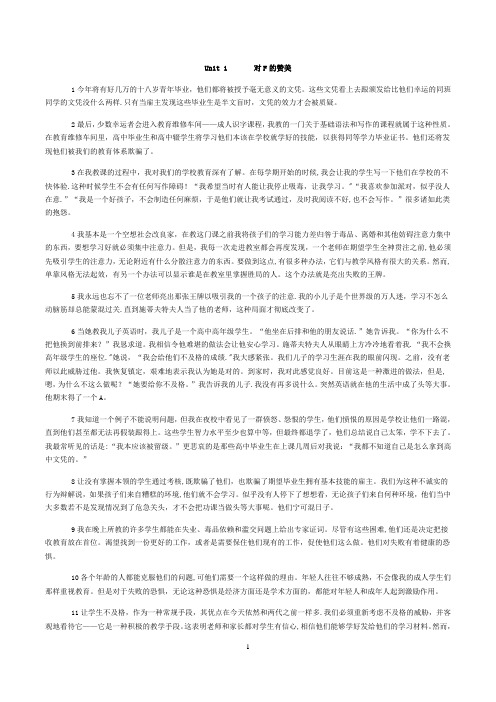
Unit 1 对F的赞美1今年将有好几万的十八岁青年毕业,他们都将被授予毫无意义的文凭。
这些文凭看上去跟颁发给比他们幸运的同班同学的文凭没什么两样.只有当雇主发现这些毕业生是半文盲时,文凭的效力才会被质疑。
2最后,少数幸运者会进入教育维修车间——成人识字课程,我教的一门关于基础语法和写作的课程就属于这种性质。
在教育维修车间里,高中毕业生和高中辍学生将学习他们本该在学校就学好的技能,以获得同等学力毕业证书。
他们还将发现他们被我们的教育体系欺骗了。
3在我教课的过程中,我对我们的学校教育深有了解。
在每学期开始的时候,我会让我的学生写一下他们在学校的不快体验.这种时候学生不会有任何写作障碍!“我希望当时有人能让我停止吸毒,让我学习。
"“我喜欢参加派对,似乎没人在意.”“我是一个好孩子,不会制造任何麻烦,于是他们就让我考试通过,及时我阅读不好,也不会写作。
”很多诸如此类的抱怨。
4我基本是一个空想社会改良家,在教这门课之前我将孩子们的学习能力差归咎于毒品、离婚和其他妨碍注意力集中的东西,要想学习好就必须集中注意力。
但是,我每一次走进教室都会再度发现,一个老师在期望学生全神贯注之前,他必须先吸引学生的注意力,无论附近有什么分散注意力的东西。
要做到这点,有很多种办法,它们与教学风格有很大的关系。
然而,单靠风格无法起效,有另一个办法可以显示谁是在教室里掌握胜局的人。
这个办法就是亮出失败的王牌。
5我永远也忘不了一位老师亮出那张王牌以吸引我的一个孩子的注意.我的小儿子是个世界级的万人迷,学习不怎么动脑筋却总能蒙混过关.直到施蒂夫特夫人当了他的老师,这种局面才彻底改变了。
6当她教我儿子英语时,我儿子是一个高中高年级学生。
“他坐在后排和他的朋友说话.”她告诉我。
“你为什么不把他换到前排来?”我恳求道。
我相信令他难堪的做法会让他安心学习。
施蒂夫特夫人从眼睛上方冷冷地看着我.“我不会换高年级学生的座位."她说,“我会给他们不及格的成绩."我大感紧张。
新标准大学英语综合教程2 Unit 6课文翻译

Unit 6Active reading (1)梦想成真当夜幕降临悉尼时,雨也开始悄悄地从夜空中飘落。
几百盏灯把澳大利亚体育场照得灯火通明,场内的声音震耳欲聋。
走向跑道时我看了一眼四周看台上无数的脸,但我的注意力还是很集中。
再过几分钟奥运金牌的归属就要见分晓了,它悬挂在远处,很诱人。
我心在剧烈地跳动,口干舌燥,肾上腺素猛增。
童年的梦想就要实现了,这种感觉真是太奇妙了:令人非常兴奋,又胆战心惊。
我知道,为了确保能梦想成真我必须强迫自己超越已知的极限。
我极力保持镇静,告诫自己不要紧张,要坚持按原计划做,按自己的节奏跑。
我知道那些俄罗斯姑娘起跑很快——这场比赛我落后俄罗斯运动员叶莲娜·普罗科霍洛娃不能超过十秒。
如果我做到这一点,冠军就是我的了。
我望着四百米跑道的起跑点,屏住了呼吸。
这些年来,在世锦赛、英联邦锦标赛以及欧洲锦标赛的八百米赛跑中我屡战屡败,饱受挫折。
现在,它再次横在我与奥运冠军头衔之间。
我的英国支持者在为我欢呼,声音特别大,就好像看台上只有他们是粉丝。
我听到他们喊我的名字,为我鼓劲加油,听到他们充满希望的呐喊。
宽阔美丽的体育场上到处飘扬着大不列颠联合王国的国旗,我感觉自己和观众融为了一体:我们有着同样的期盼,同样的梦想。
几个小时前,我的脚踝在跳远时受了伤,缠上了绷带,但是我忘掉伤痛,尽量把注意力集中在观众身上。
他们的叫喊声势浩大,使我精神振奋,我感到镇定自若。
我知道自己会全力以赴,拼尽全力跑完全程。
我感觉自己已经进入最佳状态。
我只要跑两圈就行了,就两圈。
跑完这两圈,过去两天以及28 年来所有情感和身体上的辛苦付出就将被胜利或者失败所淹没。
这一跑真是生死攸关。
我不断地告诉自己:也就是跑两分钟,谁都能跑两分钟。
发令枪响了,比赛正式开始。
第一圈还好,我跟其他人跑得一样快,但我觉得比平时要累得多,比我预想的要累得多。
这次锦标赛赛前长达数周的艰苦训练以及这两天激烈的比赛所带来的疲劳在我的赛跑过程中显现出来了。
21世纪工程硕士研究生英语-综合教程(下册)Unit6课文翻译
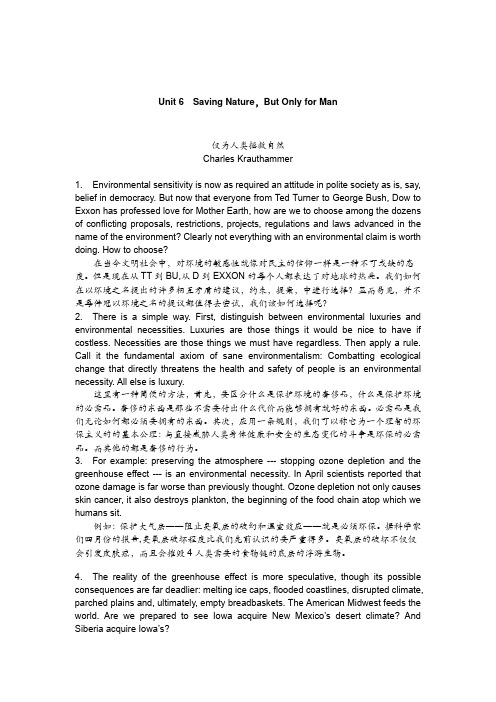
Unit 6 Saving Nature,But Only for Man仅为人类拯救自然Charles Krauthammer1. Environmental sensitivity is now as required an attitude in polite society as is, say, belief in democracy. But now that everyone from Ted Turner to George Bush, Dow to Exxon has professed love for Mother Earth, how are we to choose among the dozens of conflicting proposals, restrictions, projects, regulations and laws advanced in the name of the environment? Clearly not everything with an environmental claim is worth doing. How to choose?在当今文明社会中,对环境的敏感性就像对民主的信仰一样是一种不可或缺的态度。
但是现在从TT到BU,从D到EXXON的每个人都表达了对地球的热爱。
我们如何在以环境之名提出的许多相互矛盾的建议,约束,提案,中进行选择?显而易见,并不是每件冠以环境之名的提议都值得去尝试,我们该如何选择呢?2. There is a simple way. First, distinguish between environmental luxuries and environmental necessities. Luxuries are those things it would be nice to have if costless. Necessities are those things we must have regardless. Then apply a rule. Call it the fundamental axiom of sane environmentalism: Combatting ecological change that directly threatens the health and safety of people is an environmental necessity. All else is luxury.这里有一种简便的方法,首先,要区分什么是保护环境的奢侈品,什么是保护环境的必需品。
研究生英语综合教程课文+翻译
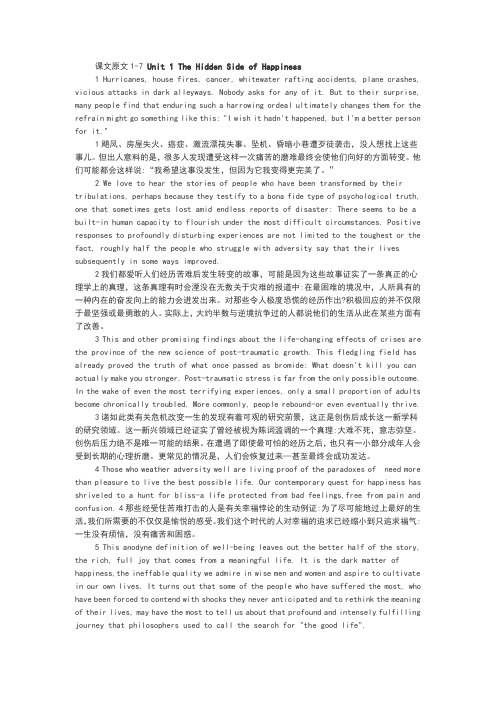
课文原文1-7 Unit 1 The Hidden Side of Happiness1 Hurricanes, house fires, cancer, whitewater rafting accidents, plane crashes, vicious attacks in dark alleyways. Nobody asks for any of it. But to their surprise, many people find that enduring such a harrowing ordeal ultimately changes them for the refrain might go something like this: "I wish it hadn't happened, but I'm a better person for it."1飓风、房屋失火、癌症、激流漂筏失事、坠机、昏暗小巷遭歹徒袭击,没人想找上这些事儿。
但出人意料的是,很多人发现遭受这样一次痛苦的磨难最终会使他们向好的方面转变。
他们可能都会这样说:“我希望这事没发生,但因为它我变得更完美了。
”2 We love to hear the stories of people who have been transformed by their tribulations, perhaps because they testify to a bona fide type of psychological truth, one that sometimes gets lost amid endless reports of disaster: There seems to be a built-in human capacity to flourish under the most difficult circumstances. Positive responses to profoundly disturbing experiences are not limited to the toughest or the fact, roughly half the people who struggle with adversity say that their lives subsequently in some ways improved.2我们都爱听人们经历苦难后发生转变的故事,可能是因为这些故事证实了一条真正的心理学上的真理,这条真理有时会湮没在无数关于灾难的报道中:在最困难的境况中,人所具有的一种内在的奋发向上的能力会进发出来。
全新版大学英语第二版综合教程6 课后翻译
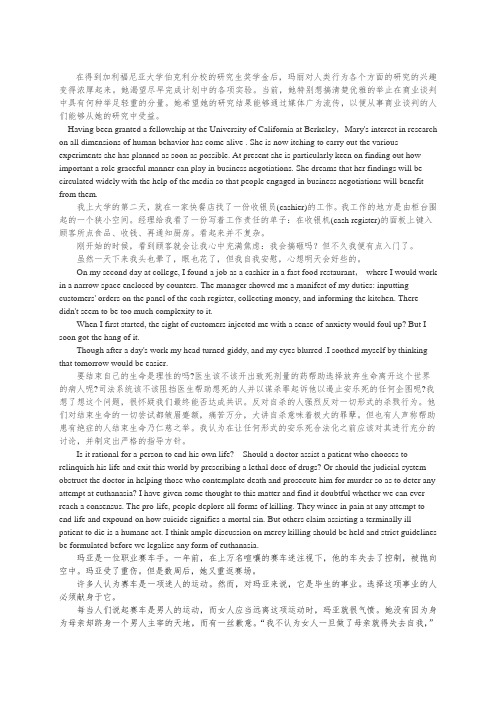
在得到加利福尼亚大学伯克利分校的研究生奖学金后,玛丽对人类行为各个方面的研究的兴趣变得浓厚起来。
她渴望尽早完成计划中的各项实验。
当前,她特别想搞清楚优雅的举止在商业谈判中具有何种举足轻重的分量。
她希望她的研究结果能够通过媒体广为流传,以便从事商业谈判的人们能够从她的研究中受益。
Having been granted a fellowship at the University of California at Berkeley,Mary's interest in research on all dimensions of human behavior has come alive . She is now itching to carry out the various experiments she has planned as soon as possible. At present she is particularly keen on finding out how important a role graceful manner can play in business negotiations. She dreams that her findings will be circulated widely with the help of the media so that people engaged in business negotiations will benefit from them.我上大学的第二天,就在一家快餐店找了一份收银员(cashier)的工作。
我工作的地方是由柜台围起的一个狭小空间。
经理给我看了一份写着工作责任的单子:在收银机(cash register)的面板上键入顾客所点食品、收钱、再通知厨房。
看起来并不复杂。
刚开始的时候,看到顾客就会让我心中充满焦虑:我会搞砸吗?但不久我便有点入门了。
21世纪大学实用英语综合教程(第一册)5,6,7课文及其翻译
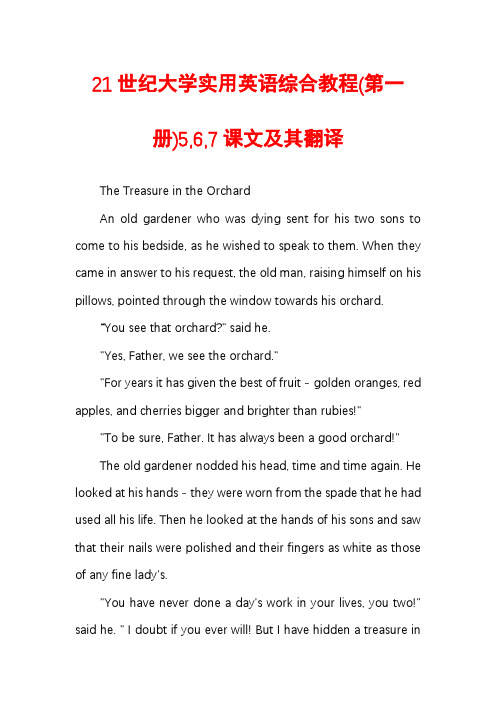
21世纪大学实用英语综合教程(第一册)5,6,7课文及其翻译The Treasure in the OrchardAn old gardener who was dying sent for his two sons to come to his bedside, as he wished to speak to them. When they came in answer to his request, the old man, raising himself on his pillows, pointed through the window towards his orchard.“You se e that orchard?" said he."Yes, Father, we see the orchard.""For years it has given the best of fruit - golden oranges, red apples, and cherries bigger and brighter than rubies!""To be sure, Father. It has always been a good orchard!"The old gardener nodded his head, time and time again. He looked at his hands - they were worn from the spade that he had used all his life. Then he looked at the hands of his sons and saw that their nails were polished and their fingers as white as those of any fine lady's."You have never done a day's work in your lives, you two!" said he. " I doubt if you ever will! But I have hidden a treasure inmy orchard for you to find. You will never possess it unless you dig it up. It lies midway between two of the trees, not too near, yet not too far from the trunks. It is yours for the trouble of digging - that is all!Then he sent them away, and soon afterwards he died. So the orchardbecame the property of his sons, and without any delay, they set to work to dig for the treasure that had been promised them.Well, they dug and dug, day after day, week after week, going down the long alleys of fruit trees, never too near yet never too far from the trunks. They dug up all the weeds and picked out all the stones, not because they liked weeding and cleaning, but because it was all part of the hunt for the buried treasure. Winter passed and spring came, and never were there such blossoms as those which hung the orange and apple and cherry trees with curtains of petals pale as pearls and soft as silk. Then summer threw sunshine over the orchard, and sometimes the clouds bathed it in cool, delicious rain. At last the time of the fruit harvest came. But the two brothers had not yet found the treasure that was hidden among the roots of the trees.Then they sent for a merchant from the nearest town to buythe fruit. It hung in great bunches, golden oranges, red apples, and cherries bigger and brighter than rubies. The merchant looked at them in open admiration."This is the finest crop I have yet seen," said he, " I will give you twenty bags of money for it!"Twenty bags of money were more than the two brothers had ever owned in their life. They struck the bargain in great delight and took the money - bags into the house, while the merchant made arrangements to carry away the fruit.UNIT5 Treasure in the OrchardUNIT6 Tracking Down My DreamUNIT7 The Smile"I will come again next year," said he, " I am always glad to buy crop like this. How you must have dug and weeded and worked to get it!"He went away, and the brothers sat eyeing each other over the tops of the money-bags. Their hands were rough and toil-worn, just as the old gardener's had been when he died."Golden oranges and red apples and cherries bigger and brighterthan rubies," said one of them, softly." I believe that this is the treasure we have been digging for all year, the very treasureour father meant!"一个老园丁快死了,叫人把两个儿子叫到床边来,因为他想要对他们说话。
研究生学术综合英语16课课文及翻译

Presenting a speech(做演讲)Of all human creations, language may be the most remarkable. Through在人类所有的创造中,语言也许是影响最为深远的。
我们用语言language we share experience, formulate values, exchange ideas, transmit来分享经验,表达(传递?)价值观,交换想法,传播知识,knowledge, and sustain culture. Indeed, language is vital to think itself.传承文化。
事实上,对语言本身的思考也是至关重要的。
[Contrary to popular belief], language | does not simply mirror reality butalso helps to create our sense of reality [by giving meaning to events].和通常所认为的不同的是,语言并不只是简单地反映现实,语言在具体描述事件的时候也在帮助我们建立对现实的感知。
——语序的调整。
Good speakers have respect for language and know how it works. Words are the tools of a speaker’s craft. They have special uses, just like the tools of any other profession. As a speaker, you should be aware of the meaning of words and know how to use language accurately, clearly,vividly,and appropriately.好的演讲者对语言很重视,也知道如何让它发挥更好的效果。
研究生新世纪大学英语系列教材综合教程6课文翻译

Text 1 Teaching in Your Pajamas:Lessons of Online Class穿着睡衣讲课:网络课程经验谈1 对我来说,在大学讲课有一点让我很喜欢,就是精心打扮然后呈上一场精彩的表演。
我会换一身得体的套装、化好妆、配上相应的饰品,甚至把上课用的提示卡都会重新修订一番。
2 不过,一个星期五的晚上,我就坐在这里给二十五个学生讲课,还穿着淡紫色睡衣。
没错,我在网上授课。
3 去年,校方要求我上一个本科班的环境学网络课—这门课我在暑假学校已经教了好几年了。
我质疑这种教学方式的有效性。
我怎么会知道提交作业的学生就是注册的哪位呢?但话又说回来,我又真的知道在传统班上坐着的学生就一定是注册了的吗?4 网络教学也要求我重新思考讲授课程内容的方式。
十七年了,我一直是站在学生面前讲授化学和环境科学的。
学对我的评价一直都极其肯定,通常会提到我的热情,幽默感及用通俗易懂的语言讲授课程的能力。
我面临的挑战是要通过计算机也能做到的一切。
5 我还在考虑哲学与教学方面的问题呢,女儿则选了两门网络课程。
结果,这反倒成了我最好的学习经历。
6 她一向是个非常腼腆的学生,从来不在课堂上发言。
但在这些网络课程中,她全心投入讨论,发表意见,总的说来比以往任何时候都更能放开参与。
7我也选了一门为我们学校的网络教师开设的短训课程,得知很多同事也很腼腆,通过计算机教学他们感受更得心应手。
8 因为要在暑假学校讲授环境科学课,趁这机会为秋季的网络课程备课看来再合适不过了。
我的计划是这样的:在上传统课的那天,早上备课,修整草坪,然后晚上去教课。
9我一直没去成草坪。
每一堂课都需要花八个小时左右的时间打字解释,好让在线学生能看明白,我也让教室里的学生能看到这些课件,他们很高兴提些意见。
10 网络班开课了,学生都能很好地遵守指令。
他们写传记,综述与环境问题相关的新闻报道。
他们回到有关自己对于环境方面所作贡献的问题,有时还坦白交代一些令人吃惊的个人习惯。
学术综合英语1-3-6课课文及翻译

Presenting a speech(做演讲)Of all human creations, language may be the most remarkable. Through language we share experience, formulate values, exchange ideas, transmit knowledge, and sustain culture. Indeed, language is vital to think itself. [Contrary to popular belief], language | does not simply mirror reality but also helps to create our sense of reality [by giving meaning to events].在人类所有的创造中,语言也许是影响最为深远的。
我们用语言来分享经验,表达(传递?)价值观,交换想法,传播知识,传承文化。
事实上,对语言本身的思考也是至关重要的。
和通常所认为的不同的是,语言并不只是简单地反映现实,语言在具体描述事件的时候也在帮助我们建立对现实的感知。
——语序的调整。
Good speakers have respect for language and know how it works. Words are the tools of a speaker’s craft. They have special uses, just like the tools of any other profession. As a speaker, you should be aware of the meaning of words and know how to use language accurately, clearly,vividly,and appropriately.好的演讲者对语言很重视,也知道如何让它发挥更好的效果。
大学英语综合教程课文原文及翻译
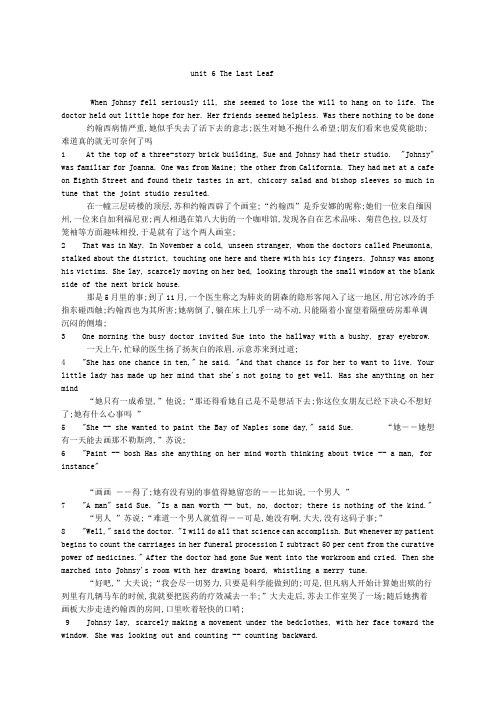
unit 6 The Last LeafWhen Johnsy fell seriously ill, she seemed to lose the will to hang on to life. The doctor held out little hope for her. Her friends seemed helpless. Was there nothing to be done 约翰西病情严重,她似乎失去了活下去的意志;医生对她不抱什么希望;朋友们看来也爱莫能助;难道真的就无可奈何了吗1 At the top of a three-story brick building, Sue and Johnsy had their studio. "Johnsy" was familiar for Joanna. One was from Maine; the other from California. They had met at a cafe on Eighth Street and found their tastes in art, chicory salad and bishop sleeves so much in tune that the joint studio resulted.在一幢三层砖楼的顶层,苏和约翰西辟了个画室;“约翰西”是乔安娜的昵称;她们一位来自缅因州,一位来自加利福尼亚;两人相遇在第八大街的一个咖啡馆,发现各自在艺术品味、菊苣色拉,以及灯笼袖等方面趣味相投,于是就有了这个两人画室;2 That was in May. In November a cold, unseen stranger, whom the doctors called Pneumonia, stalked about the district, touching one here and there with his icy fingers. Johnsy was among his victims. She lay, scarcely moving on her bed, looking through the small window at the blank side of the next brick house.那是5月里的事;到了11月,一个医生称之为肺炎的阴森的隐形客闯入了这一地区,用它冰冷的手指东碰西触;约翰西也为其所害;她病倒了,躺在床上几乎一动不动,只能隔着小窗望着隔壁砖房那单调沉闷的侧墙;3 One morning the busy doctor invited Sue into the hallway with a bushy, gray eyebrow.一天上午,忙碌的医生扬了扬灰白的浓眉,示意苏来到过道;4 "She has one chance in ten," he said. "And that chance is for her to want to live. Your little lady has made up her mind that she's not going to get well. Has she anything on her mind“她只有一成希望,”他说;“那还得看她自己是不是想活下去;你这位女朋友已经下决心不想好了;她有什么心事吗”5 "She -- she wanted to paint the Bay of Naples some day," said Sue. “她――她想有一天能去画那不勒斯湾,”苏说;6 "Paint -- bosh Has she anything on her mind worth thinking about twice -- a man, for instance"“画画――得了;她有没有别的事值得她留恋的――比如说,一个男人”7 "A man" said Sue. "Is a man worth -- but, no, doctor; there is nothing of the kind."“男人”苏说;“难道一个男人就值得――可是,她没有啊,大夫,没有这码子事;”8 "Well," said the doctor. "I will do all that science can accomplish. But whenever my patient begins to count the carriages in her funeral procession I subtract 50 per cent from the curative power of medicines." After the doctor had gone Sue went into the workroom and cried. Then she marched into Johnsy's room with her drawing board, whistling a merry tune.“好吧,”大夫说;“我会尽一切努力,只要是科学能做到的;可是,但凡病人开始计算她出殡的行列里有几辆马车的时候,我就要把医药的疗效减去一半;”大夫走后,苏去工作室哭了一场;随后她携着画板大步走进约翰西的房间,口里吹着轻快的口哨;9 Johnsy lay, scarcely making a movement under the bedclothes, with her face toward the window. She was looking out and counting -- counting backward.约翰西躺在被子下几乎一动不动,脸朝着窗;她望着窗外,数着数――倒数着数10 "Twelve," she said, and a little later "eleven"; and then "ten," and "nine"; and then "eight" and "seven," almost together.“12,”她数道,过了一会儿“11”,接着数“10”和“9”;再数“8”和“7”,几乎一口同时数下来;11 Sue looked out of the window. What was there to count There was only a bare, dreary yard to be seen, and the blank side of the brick house twenty feet away. An old, old ivy vine climbed half way up the brick wall. The cold breath of autumn had blown away its leaves, leaving it almost bare.苏朝窗外望去;外面有什么好数的呢外面只看到一个空荡荡的沉闷的院子,还有20英尺开外那砖房的侧墙,上面什么也没有;一棵古老的常青藤爬到半墙高;萧瑟秋风吹落了枝叶,藤上几乎光秃秃的; 12 "Six," said Johnsy, in almost a whisper. "They're falling faster now. Three days ago there were almost a hundred. It made my head ache to count them. But now it's easy. There goes another one. There are only five left now."“6”,约翰西数着,声音几乎听不出来;“现在叶子掉落得快多了;三天前差不多还有100片;数得我头都疼;可现在容易了;又掉了一片;这下子只剩5片了;”13 "Five what, dear "“5片什么,亲爱的”14 "Leaves. On the ivy vine. When the last one falls I must go, too. I've known that for three days. Didn't the doctor tell you"“叶子;常青藤上的叶子;等最后一片叶子掉了,我也就得走了;三天前我就知道会这样;大夫没跟你说吗”15 "Oh, I never heard of such nonsense. What have old ivy leaves to do with your getting well Don't be so silly. Why, the doctor told me this morning that your chances for getting well real soon were ten to one Try to take some soup now, and let Sudie go and buy port wine for her sick child."“噢,我从没听说过这种胡说八道;常青藤叶子跟你病好不好有什么关系别这么傻;对了,大夫上午跟我说,你的病十有八九就快好了;快喝些汤,让苏迪给她生病的孩子去买些波尔图葡萄酒来;”16 "You needn't get any more wine," said Johnsy, keeping her eyes fixed out the window. "There goes another. No, I don't want any soup. That leaves just four. I want to see the last one fall before it gets dark. Then I'll go, too. I'm tired of waiting. I'm tired of thinking.I want to turn loose my hold on everything, and go sailing down, down, just like one of those poor, tired leaves."“你不用再去买酒了,”约翰西说道,两眼一直盯着窗外;“又掉了一片;不,我不想喝汤;这一下只剩下4片了;我要在天黑前看到最后一片叶子掉落;那时我也就跟着走了;我都等腻了;也想腻了;我只想撇开一切, 飘然而去,就像那边一片可怜的疲倦的叶子;”17 "Try to sleep," said Sue. "I must call Behrman up to be my model for the old miner. I'll not be gone a minute."“快睡吧,”苏说;“我得叫贝尔曼上楼来给我当老矿工模特儿;我去去就来;”18 Old Behrman was a painter who lived on the ground floor beneath them. He was past sixty and had a long white beard curling down over his chest. Despite looking the part, Behrman was a failure in art. For forty years he had been always about to paint a masterpiece, but had never yet begun it. He earned a little by serving as a model to those young artists who could not pay the price of a professional. He drank gin to excess, and still talked of his coming masterpiece. For the rest he was a fierce little old man, who mocked terribly at softness in any one, and who regarded himself as guard dog to the two young artists in the studio above.老贝尔曼是住在两人楼下底层的一个画家;他已年过六旬,银白色蜷曲的长髯披挂胸前;贝尔曼看上去挺像艺术家,但在艺术上却没有什么成就;40年来他一直想创作一幅传世之作,却始终没能动手;他给那些请不起职业模特的青年画家当模特挣点小钱;他没节制地喝酒,谈论着他那即将问世的不朽之作;要说其他方面,他是个好斗的小老头,要是谁表现出一点软弱,他便大肆嘲笑,并把自己看成是楼上画室里两位年轻艺术家的看护人;19 Sue found Behrman smelling strongly of gin in his dimly lighted studio below. In one corner was a blank canvas on an easel that had been waiting there for twenty-five years to receive the first line of the masterpiece. She told him of Johnsy's fancy, and how she feared she would, indeed, light and fragile as a leaf herself, float away, when her slight hold upon the world grew weaker. Old Behrman, with his red eyes plainly streaming, shouted his contempt for such foolish imaginings.苏在楼下光线暗淡的画室里找到了贝尔曼,他满身酒味刺鼻;屋子一角的画架上支着一张从未落过笔的画布,在那儿搁了25年,等着一幅杰作的起笔;苏把约翰西的怪念头跟他说了,并说约翰西本身就像一片叶子又瘦又弱,她害怕要是她那本已脆弱的生存意志再软下去的话,真的会凋零飘落;老贝尔曼双眼通红,显然是泪涟涟的,他大声叫嚷着说他蔑视这种傻念头;20 "What" he cried. "Are there people in the world foolish enough to die because leafs drop off from a vine I have never heard of such a thing. Why do you allow such silly ideas to come into that head of hers God This is not a place in which one so good as Miss Johnsy should lie sick. Some day I will paint a masterpiece, and we shall all go away. Yes."“什么”他嚷道;“世界上竟然有这么愚蠢的人,因为树叶从藤上掉落就要去死我听都没听说过这等事;你怎么让这种傻念头钻到她那个怪脑袋里天哪这不是一个像约翰西小姐这样的好姑娘躺倒生病的地方;有朝一日我要画一幅巨作,那时候我们就离开这里;真的;”21 Johnsy was sleeping when they went upstairs. Sue pulled the shade down, and motioned Behrman into the other room. In there they peered out the window fearfully at the ivy vine. Then they looked at each other for a moment without speaking. A persistent, cold rain was falling, mingled with snow. Behrman, in his old blue shirt, took his seat as the miner on an upturned kettle for a rock.两人上了楼,约翰西已经睡着了;苏放下窗帘,示意贝尔曼去另一个房间;在那儿两人惶惶不安地凝视着窗外的常青藤;接着两人面面相觑,哑然无语;外面冷雨夹雪,淅淅沥沥;贝尔曼穿着破旧的蓝色衬衣, 坐在充当矿石的倒置的水壶上,摆出矿工的架势;22 When Sue awoke from an hour's sleep the next morning she found Johnsy with dull, wide-open eyes staring at the drawn green shade.第二天早上,只睡了一个小时的苏醒来看到约翰西睁大着无神的双眼,凝望着拉下的绿色窗帘;23 "Pull it up; I want to see," she ordered, in a whisper.“把窗帘拉起来;我要看,”她低声命令道;24 Wearily Sue obeyed.苏带着疲倦,遵命拉起窗帘;25 But, Lo after the beating rain and fierce wind that had endured through the night, there yet stood out against the brick wall one ivy leaf. It was the last on the vine. Still dark green near its stem, but with its edges colored yellow, it hung bravely from a branch some twenty feet above the ground.可是,瞧经过一整夜的急风骤雨,竟然还存留一片常青藤叶,背靠砖墙,格外显目;这是常青藤上的最后一片叶子;近梗部位仍呈暗绿色,但边缘已经泛黄了,它无所畏惧地挂在离地20多英尺高的枝干上;26 "It is the last one," said Johnsy. "I thought it would surely fall during the night.I heard the wind. It will fall today, and I shall die at the same time."“这是最后一片叶子,”约翰西说;“我以为夜里它肯定会掉落的;我晚上听到大风呼啸;今天它会掉落的,叶子掉的时候,也是我死的时候;”27 The day wore away, and even through the twilight they could see the lone ivy leaf clinging to its stem against the wall. And then, with the coming of the night the north wind was again loosed.白天慢慢过去了,即便在暮色黄昏之中,他们仍能看到那片孤零零的常青藤叶子,背靠砖墙,紧紧抱住梗茎;尔后,随着夜幕的降临,又是北风大作;28 When it was light enough Johnsy, the merciless, commanded that the shade be raised.等天色亮起,冷酷无情的约翰西命令将窗帘拉起;29 The ivy leaf was still there.常青藤叶依然挺在;30 Johnsy lay for a long time looking at it. And then she called to Sue, who was stirring her chicken soup over the gas stove.约翰西躺在那儿,望着它许久许久;接着她大声呼唤正在煤气灶上搅鸡汤的苏;31 "I've been a bad girl, Sudie," said Johnsy. "Something has made that last leaf stay there to show me how wicked I was. It is a sin to want to die. You may bring me a little soup now, and some milk with a little port in it and -- no; bring me a hand-mirror first, and then pack some pillows about me, and I will sit up and watch you cook."“我一直像个不乖的孩子,苏迪,”约翰西说;“有一种力量让那最后一片叶子不掉,好让我看到自己有多坏;想死是一种罪过;你给我喝点汤吧,再来点牛奶,稍放一点波尔图葡萄酒――不,先给我拿面小镜子来,弄几个枕头垫在我身边,我要坐起来看你做菜;”32 An hour later she said:一个小时之后,她说:33 "Sudie, some day I hope to paint the Bay of Naples."“苏迪,我真想有一天去画那不勒斯海湾;”34 The doctor came in the afternoon, and Sue had an excuse to go into the hallway as he left.下午大夫来了,他走时苏找了个借口跟进了过道;35 "Even chances," said the doctor, taking Sue's thin, shaking hand in his.“现在是势均力敌,”大夫说着,握了握苏纤细颤抖的手;36 "With good nursing you'll win. And now I must see another case I have downstairs. Behrman, his name is -- some kind of an artist, I believe. Pneumonia, too. He is an old, weak man, and the attack is acute. There is no hope for him; but he goes to the hospital today to be made more comfortable."“只要精心照料,你就赢了;现在我得去楼下看另外一个病人了;贝尔曼,是他的名字――记得是个什么画家;也是肺炎;他年老体弱,病来势又猛;他是没救了;不过今天他去了医院,照料得会好一点;”37 The next day the doctor said to Sue: "She's out of danger. You've won. The right food and care now -- that's all."第二天,大夫对苏说:“她脱离危险了;你赢了;注意饮食,好好照顾,就行了;”38 And that afternoon Sue came to the bed where Johnsy lay and put one arm around her.当日下午,苏来到约翰西的床头,用一只手臂搂住她;39 "I have something to tell you, white mouse," she said. "Mr. Behrman died of pneumonia today in the hospital. He was ill only two days. He was found on the morning of the first day in his room downstairs helpless with pain. His shoes and clothing were wet through and icy cold. They couldn't imagine where he had been on such a terrible night. And then they found a lantern, still lighted, and a ladder that had been dragged from its place, and some scatteredbrushes, and a palette with green and yellow colors mixed on it, and -- look out the window, dear, at the last ivy leaf on the wall. Didn't you wonder why it never fluttered or moved when the wind blew Ah, darling, it's Behrman's masterpiece -- he painted it there the night that the last leaf fell." “我跟你说件事,小白鼠,”她说;“贝尔曼先生今天在医院里得肺炎去世了;他得病才两天;发病那天上午人家在楼下他的房间里发现他疼得利害;他的鞋子衣服都湿透了,冰冷冰冷的;他们想不出那么糟糕的天气他夜里会去哪儿;后来他们发现了一个灯笼,还亮着,还有一个梯子被拖了出来,另外还有些散落的画笔,一个调色板,和着黄绿两种颜色,――看看窗外,宝贝儿,看看墙上那最后一片常青藤叶子;它在刮风的时候一动也不动,你没有觉得奇怪吗啊,亲爱的,那是贝尔曼的杰作――最后一片叶子掉落的那天夜里他画上了这片叶子;”He did not trust the woman to trust him. And he did not trust the woman not to trust him. And he did not want to be mistrusted now.他不敢相信这个女人居然会信任自己;他也不认为这个女人就不信任自己;不过,现在他不想失去别人对自己的信任;unit 7 Life of a SalesmanMaking a living as a door-to-door salesman demands a thick skin, both to protect against the weather and against constantly having the door shut in your face. Bill Porter puts up with all this and much, much more.干挨家挨户上门推销这一营生得脸皮厚,这是因为干这一行不仅要经受风吹日晒,还要承受一次又一次的闭门羹;比尔·波特忍受着这一切,以及别的种种折磨;Life of a SalesmanTom Hallman Jr.1 The alarm rings. It's 5:45. He could linger under the covers, listening to the radio and a weatherman who predicts rain. People would understand. He knows that.一个推销员的生活小汤姆·霍尔曼闹钟响了;是清晨5:45;他可以在被子里再躺一会儿,听听无线电广播;天气预报员预报有雨;人们会理解的;这点他清楚;2 A surgeon's scar cuts across his lower back. The fingers on his right hand are so twisted that he can't tie his shoes. Some days, he feels like surrendering. But his dead mother's challenge echoes in his soul. So, too, do the voices of those who believed him stupid, incapable of living independently. All his life he's struggled to prove them wrong. He will not quit.3 And so Bill Porter rises.他的下背有一道手术疤痕;他右手的手指严重扭曲,连鞋带都没法系;有时,他真想放弃不干了;可在他内心深处,一直回响着已故老母的激励, 还有那些说他蠢,说他不能独立生活的人的声音;他一生都在拚命去证明他们错了;他决不能放弃不干;于是比尔·波特起身了;4 He takes the first unsteady steps on a journey to Portland's streets, the battlefield where he fights alone for his independence and dignity. He's a door-to-door salesman. Sixty-three years old. And his enemies -- a crippled body that betrays him and a changing world that no longer needs him -- are gaining on him.他摇摇晃晃迈出了去波特兰大街的头几步,波特兰大街是他为独立与尊严而孤身搏杀的战场;他是个挨家挨户上门推销的推销员,今年63岁;他的敌人――辜负他的残疾的身体和一个不再需要他的变化着的世界――正一步一步把他逼向绝境;5 With trembling hands he assembles his weapons: dark slacks, blue shirt and matching jacket, brown tie, tan raincoat and hat. Image, he believes, is everything.他用颤抖的双手收拾行装:深色宽松裤,蓝衬衣和与之相配的茄克衫,褐色领带,土褐色雨衣和帽子;在他看来,形象就是一切;6 He stops in the entryway, picks up his briefcase and steps outside. A fall wind has kicked up. The weatherman was right. He pulls his raincoat tighter.7 He tilts his hat just so. 他在门口停了一下,提起公文包,走了出去;秋风骤起,冷飕飕的;天气预报员说得没错;他将雨衣裹裹紧;他把帽子往一侧微微一斜;8 On the 7:45 bus that stops across the street, he leaves his briefcase next to the driver and finds a seat in the middle of a pack of bored teenagers.在街对面停靠的7:45那班公共汽车上,他把公文包放在司机身旁,在一群没精打采的十几岁的孩子当中找了个位子坐下;9 He leans forward, stares toward the driver, sits back, then repeats the process. His nervousness makes him laugh uncontrollably. The teenagers stare at him. They don't realize Porter's afraid someone will steal his briefcase, with the glasses, brochures, order forms and clip-on tie that he needs to survive.他身子往前一倾,盯着司机那儿望,然后靠着椅背坐下,接着他又反复这个过程;他心情紧张,控制不住自己而笑出声来;那些孩子望着他;他们不明白,波特是担心有人偷他的包,包里有他生存不可缺少的眼镜,宣传小册子,定单,以及可用别针别上的领带;10 Porter senses the stares. He looks at the floor.波特意识到了小孩子在盯着他看;他把目光转向车厢地板;11 His face reveals nothing. In his heart, though, he knows he should have been like these kids, like everyone on this bus. He's not angry. But he knows. His mother explained how the delivery had been difficult, how the doctor had used an instrument that crushed a section of his brain and caused cerebral palsy, a disorder of the nervous system that affects his speech, hands and walk.他脸上没有流露出任何神情;但在他心里,他知道自己本该和这些孩子一样,和车上其他所有人一样;他并不生气;但他心里明白;他母亲解释说生他时难产,医生使用了某种器械,损坏了他大脑的一部分,导致了大脑性麻痹,一种影响他说话,手部活动以及行走的神经系统的紊乱;12 Porter came to Portland when he was 13 after his father, a salesman, was transferred here. He attended a school for the disabled and then Lincoln High School, where he was placed in a class for slow kids.波特13岁那年随着当推销员的父亲工作调动来到波特兰;他上了一个残疾人学校,后来就读林肯高级中学,在那儿他被编入慢班;13 But he wasn't slow.但他并不笨;14 His mind was trapped in a body that didn't work. Speaking was difficult and took time. People were impatient and didn't listen. He felt different -- was different -- from the kids who rushed about in the halls and planned dances he would never attend.他由于身体不能正常运行而使脑子不能充分发挥其功能;他说话困难,而且慢;别人不耐烦,不听他说;他觉得自己不同于――事实上也确实不同于――那些在过道里东奔西跑的孩子,那些孩子安排的舞会他永远也不可能参加;15 What could his future be Porter wanted to do something and his mother was certain that he could rise above his limitations. With her encouragement, he applied for a job with the Fuller Brush Co. only to be turned down. He couldn't carry a product briefcase or walk a route, they said.他将来会是个什么样子呢波特想做些事,母亲也相信他能冲破身体的局限;在她的鼓励之下,他向福勒牙刷公司申请一份工作,结果却遭到拒绝;他不能提样品包,也不能跑一条推销线路,他们说;16 Porter knew he wanted to be a salesman. He began reading help wanted ads in the newspaper. When he saw one for Watkins, a company that sold household products door-to-door, his mother set up a meeting with a representative. The man said no, but Porter wouldn't listen. He just wanted a chance. The man gave in and offered Porter a section of the city that no salesman wanted.波特知道自己想当推销员;他开始阅读报纸上的招聘广告;他看到沃特金斯,一家上门推销家用物品的公司要人,他母亲就跟其代理人安排会面;那人说不行,可波特不予理会;他就是需要一个机会;那人让步了,把城里一个其他推销员都不要的区域派给了他;17 It took Porter four false starts before he found the courage to ring the first doorbell. The man who answered told him to go away, a pattern repeated throughout the day.波特一开始四次都没敢敲门,第五次才鼓起勇气按了第一户人家的门铃;开门的那人让他走开,这种情形持续了一整天;18 That night Porter read through company literature and discovered the products were guaranteed. He would sell that pledge. He just needed people to listen.当晚,波特仔细阅读了公司的宣传资料,发现产品都是保用的;他要把保用作为卖点;只要别人肯听他说话就成;19 If a customer turned him down, Porter kept coming back until they heard him. And he sold.要是客户回绝波特,拒绝倾听他的介绍,他就一再上门;就这样他将产品卖了出去;20 For several years he was Watkins' top retail salesman. Now he is the only one of the company's 44,000 salespeople who sells door-to-door.他连着几年都是沃特金斯公司的最佳零售推销员;如今他是该公司44000名推销员中惟一一个上门推销的人;21 The bus stops in the Transit Mall, and Porter gets off.公共汽车在公交中转购物中心站停下,波特下了车;22 His body is not made for walking. Each step strains his joints. Headaches are constant visitors. His right arm is nearly useless. He can't fully control the limb. His body tilts at the waist; he seems to be heading into a strong, steady wind that keeps him off balance. At times, he looks like a toddler taking his first steps.他的身体不适合行走;每走一步关节都疼;头疼也是习以为常的事;他的右臂几乎没用;他不能完全控制这只手臂;他的身体从腰部开始前倾,看上去就像是顶着一股强劲的吹个不停的风迈步向前,风似乎要把他刮倒;有时他看上去就像是个刚刚学步的孩童;23 He walks 10 miles a day.他每天要走10英里的路程;24 His first stop today, like every day, is a shoeshine stand where employees tie his laces. Twice a week he pays for a shine. At a nearby hotel one of the doormen buttons Porter's top shirt button and slips on his clip-on tie. He then walks to another bus that drops him off a mile from his territory.像平日一样,他今天的第一站是个擦鞋摊,这里的雇员替他系好鞋带;他每周请他们擦两次鞋;附近一家旅馆的门卫替他扣上衬衣最上面一粒纽扣,戴上用别针别上的领带;随后他步行去搭乘另一部巴士,在距离他的推销区域一英里处下车;25 He left home nearly three hours ago.他是差不多3个小时前从家里动身的;26 The wind is cold and raindrops fall. Porter stops at the first house. This is the moment he's been preparing for since 5:45 a.m. He rings the bell.风冷雨淋;波特在第一户人家门前停了下来;这是他从5:45分开始就为之准备的时刻;他按了门铃;27 A woman comes to the door.一位妇人开了门;28 "Hello."29 "No, thank you, I'm just preparing to leave."30 Porter nods.31 "May I come back later" he asks.32 "No," says the woman.33 She shuts the door.34 Porter's eyes reveal nothing.35 He moves to the next house.36 The door opens.37 Then closes.“你好;”“不,多谢了;我这就要出门;”波特点点头;“那我过会儿来,可以吗”他问;“不用了,”那妇人回答道;她关上了门;波特眼里没有流露丝毫神情;他转向下一个人家;门开了;随即又关上;38 He doesn't get a chance to speak. Porter's expression never changes. He stops at every home in his territory. People might not buy now. Next time. Maybe. No doesn't mean never. Some of his best customers are people who repeatedly turned him down before buying.他连开口说话的机会都没有;波特的表情从不改变;他敲开自己推销区内的每一个家门;人们现在可能不买什么;也许下一次会买;现在不买不等于永远不买;他的一些老客户都是那些多次把他拒之门外而后来才买的人;39 He makes his way down the street.40 "I don't want to try it."41 "Maybe next time."42 "I'm sorry. I'm on the phone right now."43 "No."他沿着街道往前走;“我不想试用这个产品;”“也许下次试一试;”“对不起;我在打电话;”“不要;”44 Ninety minutes later, Porter still has not made a sale. But there is always another home.45 He walks on.46 He knocks on a door. A woman appears from the backyard where she's gardening. She often buys, but not today, she says, as she walks away.47 "Are you sure" Porter asks.48 She pauses.49 "Well..."90分钟之后,波特仍没能卖出一件物品;不过,下面有的是人家;他继续向前走;他敲响一扇门;一位正在拾掇花园的妇女从后院走了出来;她常常买他的东西,不过今天不买,她说着走开了;“你真的不买什么”波特问;她迟疑了一下;“那么……”50 That's all Porter needs. He walks as fast as he can, tailing her as she heads to the backyard. He sets his briefcase down and opens it. He puts on his glasses, removes his brochures and begins his sales talk, showing the woman pictures and describing each product.波特要的就是这一迟疑;他尽可能快步上前,跟着她朝后院走去;他放下公文包,打了开来;他戴上眼镜,拿出产品介绍小册子,开始推销,给那位妇人看图片,详细介绍每一个产品;51 Spices52 "No."53 Jams54 "No. Maybe nothing today, Bill."55 Porter's hearing is the one perfect thing his body does. Except when he gets a live one. Then the word "no" does not register.调料“不要;”果酱“不要;恐怕今天不要什么,比尔;”波特的听觉是他身上惟一没有一点毛病的功能;只有当他察觉对方有可能买他东西的时候才会发生例外;这个时候,他是听不见“不”字的;56 Pepper57 "No."58 Laundry soap59 "Hmm."60 Porter stops. He smells blood. He quickly remembers her last order.61 "Say, aren't you about out of soap That's what you bought last time. You ought to be out right about now."62 "You're right, Bill. I'll take one."胡椒粉“不要;”洗衣皂“嗯;”波特停了下来;他嗅到了猎物;他很快记起了她上次的订单;“对了,你肥皂差不多用完了吧你上次买的就是这个;现在该差不多用完了;”“没错,比尔;我买一块;”63 He arrives home, in a rainstorm, after 7 . Today was not profitable. He tells himself not to worry. Four days left in the week.晚上7点过后,他在暴风雨中回到了家;今天没赚钱;他跟自己说别着急;这个星期还有4天呢;64 At least he's off his feet and home.至少他回到了家,不用再站立了;。
研究生学术综合英语Units1-6课文及翻译

Unit 1 Presenting a speech(做演讲)Of all human creations, language may be the most remarkable. Through在人类所有的创造中,语言也许是影响最为深远的。
我们用语言language we share experience, formulate values, exchange ideas, transmit来分享经验,表达(传递?)价值观,交换想法,传播知识,knowledge, and sustain culture. Indeed, language is vital to think itself.传承文化。
事实上,对语言本身的思考也是至关重要的。
[Contrary to popular belief], language | does not simply mirror reality butalso helps to create our sense of reality [by giving meaning to events].和通常所认为的不同的是,语言并不只是简单地反映现实,语言在具体描述事件的时候也在帮助我们建立对现实的感知。
——语序的调整。
Good speakers have respect for language and know how it works. Words are the tools of a speaker’s craft. They have special uses, just like the tools of any other profession. As a speaker, you should be aware of the meaning of words and know how to use language accurately, clearly,vividly,and appropriately.好的演讲者对语言很重视,也知道如何让它发挥更好的效果。
- 1、下载文档前请自行甄别文档内容的完整性,平台不提供额外的编辑、内容补充、找答案等附加服务。
- 2、"仅部分预览"的文档,不可在线预览部分如存在完整性等问题,可反馈申请退款(可完整预览的文档不适用该条件!)。
- 3、如文档侵犯您的权益,请联系客服反馈,我们会尽快为您处理(人工客服工作时间:9:00-18:30)。
综合英语第六册课文翻译Unit 1让我向您介绍智障技术。
这是先进技术的对面。
先进的技术使我们能够做有益的新事物,或做旧的东西,更有效地。
相比之下,智障技术创造新的和昂贵的方式做了一次简单,成本低廉的东西。
更糟的是,它鼓励我们这样做,并不需要在所有做的事情。
它废物可敬,精心制作,诱人和更有趣的。
只是其他的一周,“新闻周刊”报道了电子图书的热潮。
我们的想法是把光碟上的书,你可以插入到您的自定义的计算机图书展示。
这里有一个智障技术的膨胀想法。
一方面,你可以买到900美元或9000美元本书读计算机,您可以与您最喜爱的书籍$ 20片喂。
这是累赘。
如果你把它的海滩,它被用沙子堵塞。
你不能使用它作为一个枕头。
如果它滑出厨房柜台,摔破。
另一方面,你可以买到一个老式的书。
这是更便宜,更流动,那么脆弱,更耐用。
你可以把它借给,甚至偶然的朋友。
如果你不喜欢它,你可以停止阅读不恨自己永远买它。
失去它是不是一个创伤事件。
亲技术的复出是计算机总有一天会压缩到整个芯片或光盘库,从而打开了广阔的前景的信息几乎每个人都。
与此麻烦的是算术和常识。
一个学校图书馆有2,000本书在理论上可以同时2,000读者服务。
学校图书馆与一台计算机终端,可致电20万册,可以在同一时间只有一个读者服务。
计算机创建一个瓶颈。
肯定的是,库可以购买更多的电脑,但他们比书更昂贵和笨重。
最后,还有的常识:大多数人真正需要的,比方说,纽约公共图书馆的整个集合的访问?这里是另一种技术的赛车落后的例子:视频新闻稿。
在我的生意,我们轰炸产品,政治家和政策的新闻稿。
现在有宣传片。
相反的,花了两天时间准备和29美分,至邮件的10%的新闻稿中,我得到一个$ 4.50的磁带,耗资2,邮件和两个月的时间来准备。
我可以阅读之前折腾其中99%在10或15秒的标准新闻稿。
但影片会立即抛出。
要查看他们需要找到一台录像机和浪费5到10分钟看。
抱歉没有出售。
视频成本更不会少。
我不认为所有的技术是坏。
天哪,没有。
我国是一个突出的技术动荡的时代。
但新技术的本意是收益- 收入增长,提高生产率- 似乎在躲避着我们。
不知何故,必须解释的矛盾。
一种理论认为,我们仍然在原始阶段,比方说,电脑革命,将很快破灭后,我们的full.benefits。
也许吧。
(一个自然的推论是,像我这样的技术dopes是阻碍进步。
)但这个理论,我想补充的智障技术的概念。
啊,新技术的成果是丰富的和真实的。
但好处是被粗暴地抵消了很多技术灵感废物。
技术常常被误用的原因,因为的人拥抱,它可以是相当轻薄。
即:设在檀香山的哥哥得到一个车载电话。
他甚至可能需要它的工作。
那么,你可以没有一个?显然不是。
需要的不是一个问题。
(自1985年以来,移动电话用户数已跃居从34万到800万左右。
)新机器往往是大人的玩具,积木和娃娃的接班人。
一个女人,我深知我的妻子,最近她的个人电脑上创建请柬后,兴高采烈。
(我不敢问多久了。
)“我知道我可以出去买霍尔马克卡,”她说。
“不过,我真为自己感到骄傲,我很高兴。
”在办公室里,电脑邮件已经变成一整天的事情空闲攀谈。
每一项新技术激发的诱惑,看到它会做什么,不管如何空洞或费时的任务。
这是对技术相当于“我们爬上山,因为它的存在。
”因此,视频新闻稿。
学术生活的整个领域(政治学,经济学,甚至历史)现在越来越多的数字运算。
计算机允许数字是很容易计算,所以它们。
真正的思想是气馁。
同样的思想隔阻过程折磨着美国的经理。
愚蠢的技术生存受戒自我和金钱。
新技术往往需要巨额投资。
一旦投资,他们不能很容易被作废了。
这样做会很尴尬。
被淘汰旧的做事和廉价的方法,以帮助支付新的和昂贵的方法。
成为制度化和永久阻燃技术。
这是经常被拒绝,因为人们不会承认他们是琐屑无聊或浪费。
一个蜂窝手机用户的调查发现,87%的受访者表示自己的手机,他们的生产力提高了36%的平均。
超过一半(54%)说,手机已经提高了他们的婚姻。
试想一下,如果这些成果推广到整个人口:我们的经济产出将即刻蹿由600万亿至8万亿;离婚率将大幅下挫,以及“家庭价值”会取得胜利。
我们需要的是细胞的补贴,让大家都能有一个。
节拍。
苹果电脑公司最近宣布,牛顿,一代手持“个人数字助理”。
当你涂抹小的显示屏上的东西,牛顿,苹果公司表示,将识别你的笔迹。
这似乎令人印象深刻。
你乱写的“张三”,和牛顿调用其内存从“张三”,并告诉您乔的电话号码和其他任何你在乔的微小文件。
就像一个关系网。
嘿,也许一个关系网,是更好的。
它更便宜。
一个标准的笔记本电脑或地址簿如何?他们已经接受手写。
即使看中的地址簿的成本只有15元或20元。
苹果公司表示,牛顿(这也将作为一个寻呼机,并通过电话线发送消息)的价格将低于1000美元。
“这应该是一个了不起的成功。
Unit 2在第二次世界大战期间的炸弹发起猛攻曼联成长意味着时间是艰难的,钱是短暂的,焦虑是普遍存在的典当行是一个熟悉许多家庭,包括我的目的地。
然而,我不能要求更为进取,乐观的父母。
他们认为我们全家一起努力工作,尊严和欢呼开始酸痛。
我的坚固和巧妙的流行可能把他的手几乎所有的东西,从来没有木工和勤杂工的工作。
他甚至还参加了在奇数后街拳击回合入不敷出。
对于她来说,我们的MAM节俭和精心干净,和她的五个孩子总是送到学校以及喂饭,擦洗和穿着一尘不染,尽管困难的条件下。
麻烦的是,虽然我的衣服被烫到刀口,鞋擦得一线,不是每一个项目,是标准的校服问题。
而马姆省吃俭用,以获得最齿轮,我仍然没有规定的蓝色夹克和帽子带。
由于战争,配给到位,大部分学校已放宽对明知是多么艰难获得衣服的适当制服的态度。
然而,女孩的学校,我参加了严格的政策,它的每一个学生是正确穿着,副校长,谁跑的日常大会使她的使命,教我一个教训。
尽管我尝试解释为什么我不能遵守,但事实上,我正在走向完全统一的工作进展缓慢,我每天都将被拖出行,站在舞台上,为什么不光辉的榜样穿到学校。
每天,我会战斗忍住泪水,正如我在我的同龄人,尴尬的,最经常的,独自前站。
我的惩罚也被禁止从健身房团队或不参加每周交际舞班,我崇拜的一部分。
我拼命地希望,在这个可怕的学校只有一个老师会睁开眼睛,看到所有我能做的,而不是不断地告诉我,我不能做什么。
然而,在我12岁的心,我别无选择,但要看到通过处罚。
我知道它的最重要的是不要让我的用心良苦的母亲知道这个仪式的屈辱。
我不敢冒她到学校为我说话了,因为我知道狭隘的,铁石心肠的工作人员将同样她的苦恼,这将意味着我们两个人的不满和愤慨。
,但愿,如果她告诉我的父亲,他会即刻在我的防守上的强硬立场。
后来有一天,我们家报纸的竞争赢得了一个自由摄影坐在肖像。
我自己身边,激动地说:我的想象由美艳拍摄流行好莱坞temptresses的带动。
我不能等待的激动人心的消息告诉我的朋友。
这是,直到妈妈告诉我,我会穿上我最好的,镶着花边的明亮的绿色礼服来学校的那一天,作为肖像坐直后类。
她没有料到我所面临的煎熬,并试图虚张声势关闭学校每天将有工作,如果我遭遇突发情况下的截肢或鼠疫。
有没有我所珍视的礼服当天将照常高兴。
心情沉重,我拖着自己的学校,在蓝色的大海,翠绿的目标。
在大会我没有理会,等待命令,但步履沉重地向我自己的舞台,忍受其他女孩和副组长的小眼睛窃笑。
挫折的眼泪扬言要挣脱我想无数次无情的老师为什么不能看过去我的衣服后,看到听话,渴望参与的年轻女孩下。
组装后,我们的第一类是英语文学,我用我最喜欢的老师最喜欢的课。
我安慰自己,我至少可以失去自己在狄更斯的休养生息和恢复我的镇静类的背面了一会儿,两个城市的故事。
想象我沮丧时,立即开始上课,陆McVee下令我来之前,她坐在前排,直接。
我慢慢地站起来,闪烁着泪水,率领全班同学面前。
一定小姐McVee没有越过边界进入敌方阵营的,也?低垂的眼睛,低着头,眼泪再次威胁要出卖我的沮丧,尽管我一直尽我最大努力不显示我在一次又一次单挑是多么悲惨。
小姐McVee当我把我的座位在前面,竖起她的头,一边上下打量着我仔细。
然后她走了出来,平均意气风发的地方我曾经听到的最欢迎的句子。
“亲爱的,我宣布,你是聪明和可爱的视线在这整个沉闷的学校。
我唯一的遗憾,我会看着你只是一个教训,而不是整天的乐趣。
”冰块,是我年轻的心即刻解冻,并充分发挥其高度,我的肩膀回升。
我敢肯定,微笑,我给那个女人一直是她见过的最广泛的。
我飘来通过休息一天她若有所思地选择的话,所产生的温暖鼓舞。
虽然英语文学是她的拿手好戏,那一天陆McVee教我,也许全班,在同情心的教训,我永远不会忘记。
她教我在需要的时候,一句好话可以持续一生。
事实上,她周到的话增强了我灵魂的一部分,任何人或任何事情,因为,从来没有被削弱。
Unit 4迪斯尼世界是后现代主义和后现代社会,因为它创造的幻觉,我们可以克服时间和空间,自我与社会的限制使用模拟的方式,最终展示。
但它传达的想法很多都是假的,它的幻想境界在一个以上的意义。
迪斯尼世界:模拟城市作为后现代主义的乌托邦迪斯尼世界的本质是什么?其中大部分围绕迪斯尼的努力创建的游客,他们已经进入了一个完美的世界,更加紧密地符合他们的愿望的错觉。
它以各种方式创造的这个“完美世界”。
例如,它鼓励访问者通过孩子的眼睛,看到公园和一个地方,本身定义为“带来梦想的生活。
”但最本质的一个完美的世界,它创建了一个邀请游客虚构的版本,以逃避其在物理现实的遏制,使他们不再是有限的时间,距离,大小和物理定律。
在各个景点,游客似乎漂浮通过人体,并通过DNA;他们旅行到过去和未来,并离开地球。
在惊险游乐设施,他们抵抗地心引力,移动的速度和方式似乎违反常识,告诉他们应该尽可能。
迪斯尼世界也邀请游客逃脱下降的国家和社会的自我。
它创建了美国资本主义和政治历史的理想化的愿景,并绘制成一个永恒的庆祝活动,游行和烟花,盛装的表演者和无尽的乐趣邀请,世界的游客。
是不是不像参加在一一年365天的假期,从生活中驱逐负面情绪的影响。
当你把所有这一切,它变得明显,迪斯尼世界为游客提供了虚构实现人类最深的梦想:超越。
在迪斯尼世界中,我们超越世俗。
在世界上占有一席之地,我们通常会发现自己关闭,其中大部分机会对我们大多数人的动机是隐瞒,我们走在旅途中通过象征性的,是客观的和物质的世界,但似乎失重,无忧无虑和奇妙作为想象力。
在所有这一切,迪斯尼撤销干“科学主义”对当代社会的世界观。
这是德国社会学家马克斯·韦伯说,在当今时代,我们目睹了世界科学的兴起和宗教的影响力下降的觉醒。
仿真文化,如迪斯尼,创作似乎是再妖娆,为我们新的艺术和技术,可以重新创建一个更新版本当代的浪漫故事的形式在我们周围的承诺,与空间飞行的神话,外国人,时间旅行和失去的世界。
但迪斯尼世界不只是提供物化幻想。
通过模拟的力量,它也表明我们的方法技术将给我们的力量结束了,从世界自由。
